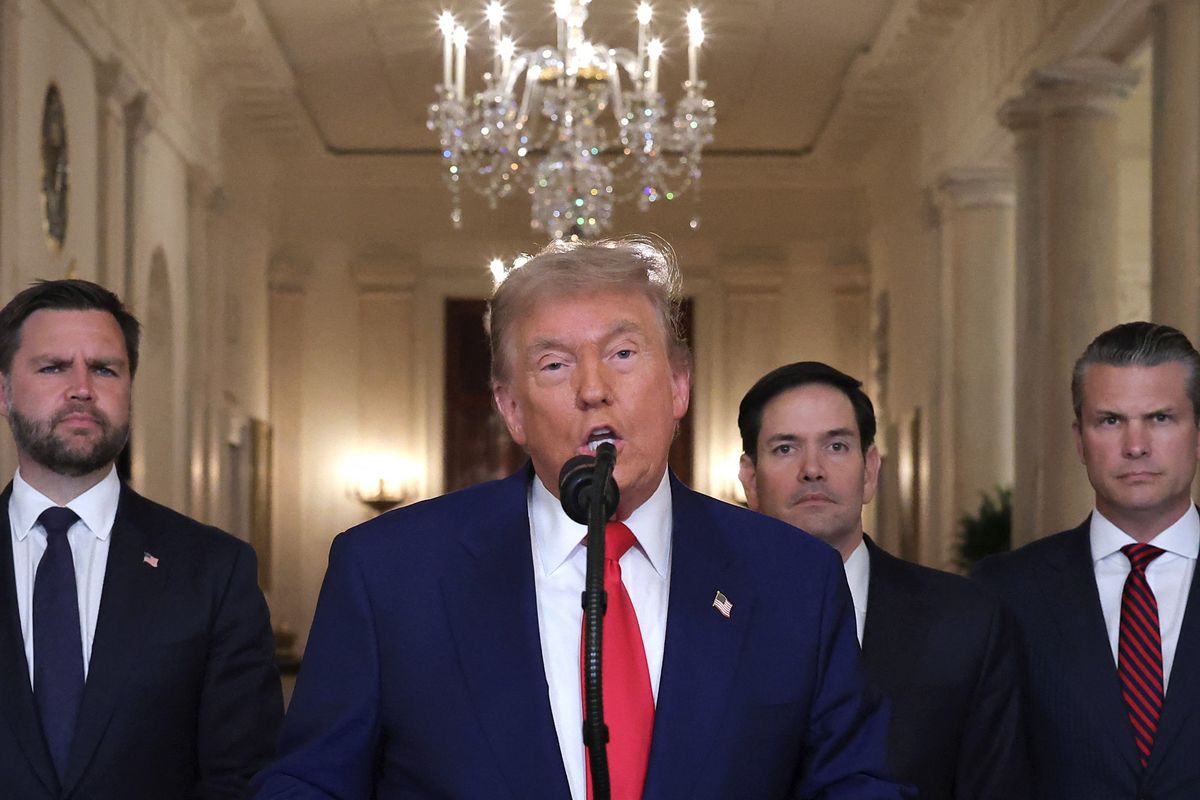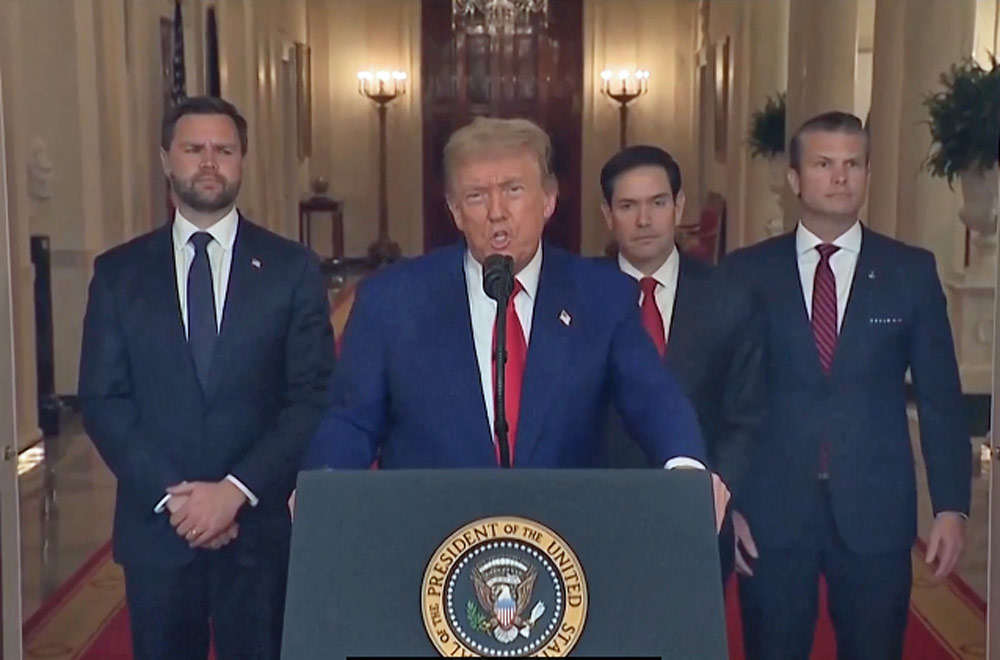It’s been known at least since 1947 that special tech teams (mainly at Wright-Patterson Air Force Base) have been dedicated to re-engineering the crashed Roswell craft. But toward more earthly designs given a decided lack of tech savvy. Aircraft like the B-2 Spirit Stealth bomber - seven of which were used to dump 14 "bunker buster" bombs on three Iranian nuclear sites over the weekend. One might well be immediately drawn to this link: highlighting a B-2 landing at a UK airfield.
Seeing B-2 stealth bombers land is like seeing alien UFOs come to Earth : r/aviation

This elicits the question of what - if anything - my late AF vet brother Jerry:

The US federal debt has now passed $37 trillion and is growing at the rate of $1 trillion every five months. Interest on the debt exceeds $1 trillion annually, second only to Social Security in the federal budget. The military outlay is also close to $1 trillion, consuming nearly half of the discretionary budget.
As a sovereign nation, the United States could avoid debt altogether by simply paying for the budget deficit with Treasury-issued “Greenbacks,” as Abraham Lincoln’s government did. But I have written on that before (see here and here), so this article will focus on that other elephant in the room, the Department of Defense (DOD).
Under the Constitution, the military budget should not be paid at all, because the Pentagon has never passed an audit. Expenditures of public funds without a public accounting violate Article 1, Section 9, Clause 7 of the Constitution, which provides:
No Money shall be drawn from the Treasury, but in Consequence of Appropriations made by Law; and a regular Statement and Account of the Receipts and Expenditures of all public Money shall be published from time to time.
On August 13, 2025, Joe Rogan interviewed US Rep. Anna Paulina Luna (R-Fla.), who leads a House Oversight Committee focused on government transparency regarding various topics, including UAPs (Unidentified Anomalous Phenomena, formerly UFOs). Luna said the committee had been formed after she and two other congresspeople were denied access at Eglin Air Force Base to information on UAPs provided by whistleblowers. The problem, she said, was that Congress was supposed to represent the public and be an investigative body for it, “and you have unelected people operating basically in secrecy… I think this goes all the way back even to JFK, with how they basically have operated outside of the purview of Congress and basically… have gone rogue…”

Twenty years ago, one day in June 2005, I talked with an Iranian man who was selling underwear at the Tehran Grand Bazaar. People all over the world want peace, he said, but governments won’t let them have it.
I thought of that conversation on Saturday night after the U.S. government attacked nuclear sites in Iran. For many days before that, polling clearly showed that most Americans did not want the United States to attack Iran. “Only 16 percent of Americans think the U.S. military should get involved in the conflict between Israel and Iran,” YouGov pollsters reported, while “60 percent say it should not and 24 percent are not sure.”
But as a practical matter, democracy has nothing to do with the chokehold that the warfare state has on the body politic. That reality has everything to do with why the United States can’t kick the war habit. And that’s why the profound quests for peace and genuine democracy are so tightly intertwined.

We’ve been here before. It’s never ended well. It’s never ended, period. A few bunker-busters aren’t about to end it either, whether they have Fordow’s Mount Doom in the bag or not. The opposite always happens in the Middle East the moment Israel and the United States substitute barbarism for diplomacy. Always.
There’s not been a single exception to the rule since 1956, the last time the United States intervened to stop Israeli (and British and French) aggression on a neighbor.
It’s not as if certain Israeli and American administrations haven’t known how to negotiate. They’ve had numerous Nobel-worthy diplomatic successes: Israel’s peace with Egypt, with Jordan, with the Palestine Liberation Organization (PLO) and its transformation into the Palestinian Authority, and more recent normalizations with Morocco, the United Arab Emirates, Bahrain and Sudan and what was the almost normalization with Saudi Arabia. Not least, there was the 2015 deal with Iran, which verifiably stopped Iran’s uranium enrichment until the current president recklessly pulled out in his first term, setting up his flim-flanked bombast last night.

In the modern era, it was probably George W. Bush who first said it out loud and then acted on it: When you’re unpopular and losing politically, just start a little war that’s easily winnable and you’ll be back on top.
As he told his biographer, Mickey Herskowitz, in 1999 about his plans for an Iraq war as a strategy to get himself reelected in 2004:
One of the keys to being seen as a great leader is to be seen as a commander-in-chief. My father had all this political capital built up when he drove the Iraqis out of (Kuwait), and he wasted it. If I have a chance to invade Iraq, if I had that much capital, I'm not going to waste it. I’m going to get everything passed I want to get passed, and I'm going to have a successful presidency.
It worked for Bush, although history hasn’t been kind to him as a result. Donald Trump’s second presidency, meanwhile, has been an unmitigated disaster, both in real terms and politically as his approval ratings have slipped so far underwater they’re in late-years Richard Nixon territory:

Friends,
The United States is now at war with Iran.
A single person — Donald J. Trump — has released the dogs of war on one of the most dangerous countries in the world, and done it without the consent of Congress, our allies, or even a clear explanation to the American people.
Anyone who has doubted Trump’s intention to replace American democracy with a dictatorship should now be fully disabused.
I share your despair, sadness, and fear. Just a week ago Saturday millions of us gathered in solidarity against Trump and for democracy, the rule of law, and social justice. Those demonstrations feel as if they occurred years ago.
Last night I spoke with a number of people experienced and knowledgable about American foreign policy and politics. Here, in brief, is what I asked and what I learned.

Followers of the Make America Great Again movement, including vocal supporters of President Donald Trump, are voicing their frustration with the president after he launched a strike Saturday on Iranian nuclear sites.
“We have completed our very successful attack on the three Nuclear sites in Iran, including Fordow, Natanz, and Esfahan,” Trump wrote in a Truth Social post Saturday. “All planes are now outside of Iran air space. A full payload of BOMBS was dropped on the primary site, Fordow. All planes are safely on their way home. Congratulations to our great American Warriors. There is not another military in the World that could have done this. NOW IS THE TIME FOR PEACE! Thank you for your attention to this matter.”
As Financial Times reports, former chief White House strategist Steve Bannon told his podcast listeners “shortly after the strikes” that “an overwhelming majority of the people [in the US] don’t want to get involved in any of this.”






No comments:
Post a Comment